九年级英语全册_Unit_6_When_was_it_invented检测题2_(新版)人教新目标版
- 格式:doc
- 大小:115.00 KB
- 文档页数:13
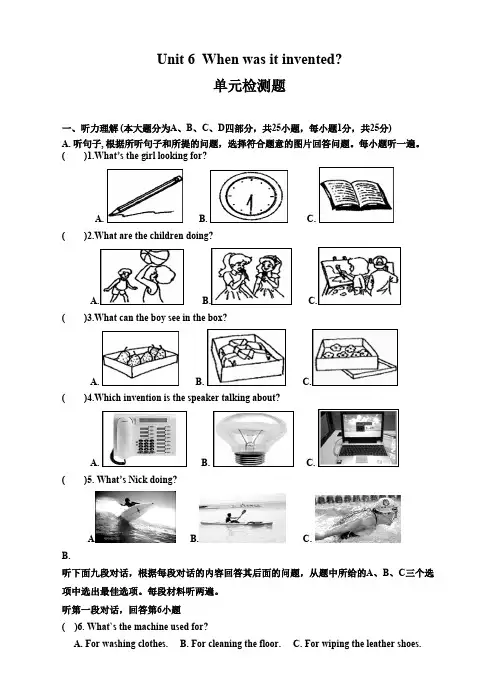
Unit 6 When was it invented?单元检测题一、听力理解 (本大题分为A、B、C、D四部分,共25小题,每小题1分,共25分)A. 听句子, 根据所听句子和所提的问题,选择符合题意的图片回答问题。
每小题听一遍。
( )1.What’s the girl looking for?A. B. C.( )2.What are the children doing?A. B. C.( )3.What can the boy see in the box?A. B. C.( )4.Which invention is the speaker talking about?A. B. C.( )5. What’s Nick doing?A B. C.B.听下面九段对话,根据每段对话的内容回答其后面的问题,从题中所给的A、B、C三个选项中选出最佳选项。
每段材料听两遍。
听第一段对话,回答第6小题( )6. What`s the machine used for?A. For washing clothes.B. For cleaning the floor.C. For wiping the leather shoes.听第二段对话,回答第7小题( )7. What does the man think of the light bulb?A. It makes us work late every day.B. It helps us live an interesting life.C. It makes the daytime longer in some extent (程度).听第三段对话,回答第8小题( )8. When was the telephone invented?A. In 1900.B. In 1927.C. In 1876.听第四段对话,回答第9小题( )9. What’s the man’s idea?A. He thinks the TV set is the most important invention.B. He thinks the car is the most important invention.C. He thinks the telephone is the most important invention.听第五段对话,回答第10小题( )10. How much will the man pay for the room for two?A. $ 28.B. $ 38.C. $ 76.听第六段对话,回答第11小题( )11. What can we learn from the dialogue?A. Students are not allowed to wear slippers in school.B. Students are allowed to wear slippers in school.C. It is very cool for students to wear slippers in school.听第七段对话,回答第12小题( )12. Why is the man here?A. He is going to take a bus.B. He wants to show his friend the way.C. He is going to meet his friend.听第8段对话,回答第13至第15题( )13. When will they plan to go out?A. On Wednesday evening.B. Tomorrow evening.C. On Thursday evening. ( )14. What does Peter ask Anna to do?A. Go to a party.B. Go to the park.C. Go to the cinema and have dinner together.( )15. How will they go?A. By bike.B. By car.C. On foot.听第9段材料,回答第16至第17题( )16. Where did the girl stay during her holiday?A. In a hotel.B. In a farmer’s house.C. In the open air.( )17. When did the girl get back?A. In the morning.B. In the afternoon.C. In the evening.C.听短文,根据短文内容,回答第18至第20题。
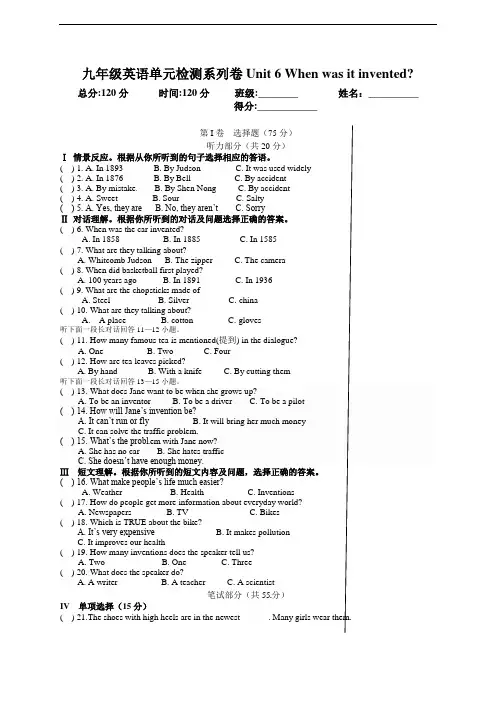
九年级英语单元检测系列卷Unit 6 When was it invented?总分:120分时间:120分班级:________ 姓名:__________得分:____________第I卷选择题(75分)听力部分(共20分)Ⅰ情景反应。
根据从你所听到的句子选择相应的答语。
( ) 1. A. In 1893 B. By Judson C. It was used widely( ) 2. A. In 1876 B. By Bell C. By accident( ) 3. A. By mistake B. By Shen Nong C. By accident( ) 4. A. Sweet B. Sour C. Salty( ) 5. A. Yes, they are B. No, they aren’t C. SorryⅡ对话理解。
根据你所听到的对话及问题选择正确的答案。
( ) 6. When was the car invented?A. In 1858B. In 1885C. In 1585( ) 7. What are they talking about?A. Whitcomb JudsonB. The zipperC. The camera( ) 8. When did basketball first played?A. 100 years agoB. In 1891C. In 1936( ) 9. What are the chopsticks made ofA. SteelB. SilverC. china( ) 10. What are they talking about?A. A placeB. cottonC. gloves听下面一段长对话回答11—12小题。
( ) 11. How many famous tea is mentioned(提到) in the dialogue?A. OneB. TwoC. Four( ) 12. How are tea leaves picked?A. By handB. With a knifeC. By cutting them听下面一段长对话回答13—15小题。
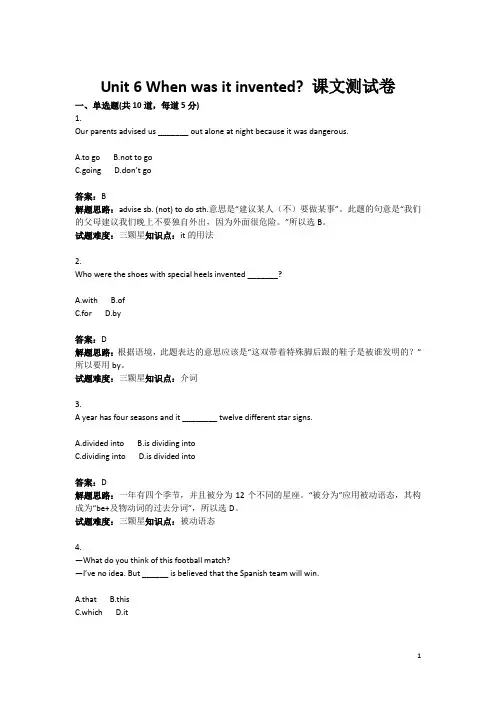
Unit 6 When was it invented? 课文测试卷一、单选题(共10道,每道5分)1.Our parents advised us _______ out alone at night because it was dangerous.A.to goB.not to goC.goingD.don’t go答案:B解题思路:advise sb. (not) to do sth.意思是“建议某人(不)要做某事”。
此题的句意是“我们的父母建议我们晚上不要独自外出,因为外面很危险。
”所以选B。
试题难度:三颗星知识点:it的用法2.Who were the shoes with special heels invented _______?A.withB.ofC.forD.by答案:D解题思路:根据语境,此题表达的意思应该是“这双带着特殊脚后跟的鞋子是被谁发明的?”所以要用by。
试题难度:三颗星知识点:介词3.A year has four seasons and it ________ twelve different star signs.A.divided intoB.is dividing intoC.dividing intoD.is divided into答案:D解题思路:一年有四个季节,并且被分为12个不同的星座。
“被分为”应用被动语态,其构成为“be+及物动词的过去分词”,所以选D。
试题难度:三颗星知识点:被动语态4.—What do you think of this football match?—I’ve no idea. But ______ is believed that the Spanish team will win.A.thatB.thisC.whichD.it答案:D解题思路:It is believed that…意思是“人们认为……”。
It做形式主语,that从句做真正主语。
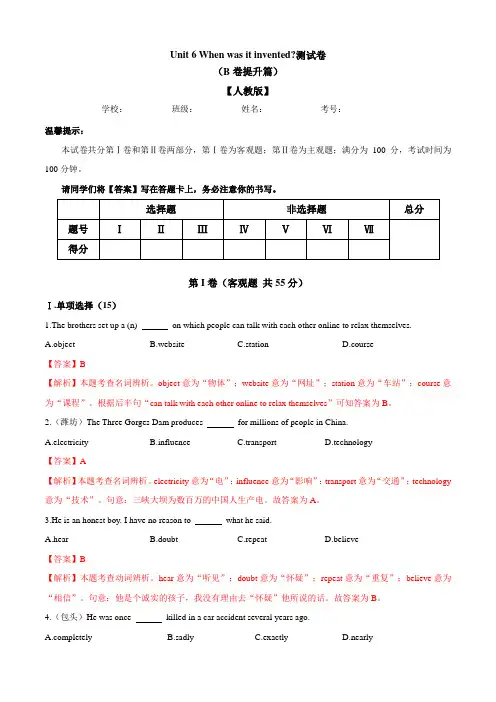
Unit 6 When was it invented?测试卷(B卷提升篇)【人教版】学校:__________班级:__________姓名:_________ 考号:___________温馨提示:本试卷共分第Ⅰ卷和第Ⅱ卷两部分,第Ⅰ卷为客观题;第Ⅱ卷为主观题;满分为100分,考试时间为100分钟。
请同学们将【答案】写在答题卡上,务必注意你的书写。
第I卷(客观题共55分)Ⅰ.单项选择(15)1.The brothers set up a (n) on which people can talk with each other online to relax themselves.A.objectB.websiteC.stationD.course【答案】B【解析】本题考查名词辨析。
object意为“物体”;website意为“网址”;station意为“车站”;course意为“课程”。
根据后半句“can talk with each other online to relax themselves”可知答案为B。
2.(潍坊)The Three Gorges Dam produces for millions of people in China.A.electricityB.influenceC.transportD.technology【答案】A【解析】本题考查名词辨析。
electricity意为“电”;influence意为“影响”;transport意为“交通”;technology 意为“技术”。
句意:三峡大坝为数百万的中国人生产电。
故答案为A。
3.He is an honest boy. I have no reason to what he said.A.hearB.doubtC.repeatD.believe【答案】B【解析】本题考查动词辨析。
hear意为“听见”;doubt意为“怀疑”;repeat意为“重复”;believe意为“相信”。
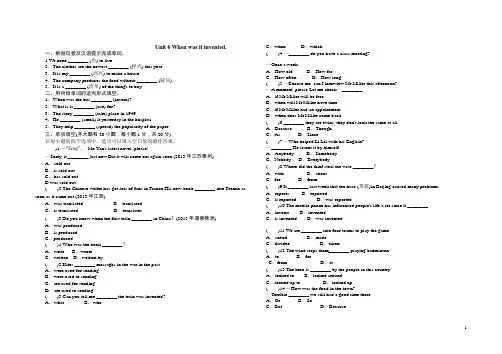
Unit 6 When was it invented.一、根据句意及汉语提示完成单词。
1.We need ________ (电) to live.2.The clothes are the newest ________ (样式) this year.3.It is my ________ (高兴) to make a house.4.The company produces the food without ________ (疑问).5.It is a ________ (清单) of the things to buy.二、用所给单词的适当形式填空。
1.When was the bus ________ (invent)?2.What is it ________ (use) for?3.The story ________ (take) place in 1949.4.He ________ (smell) it yesterday in the hospital.5.They help ________ (spread) the popularity of the paper.三、单项填空(本大题有20小题,每小题1分,共20分)在每小题的四个选项中,选出可以填入空白处的最佳答案。
)1.—“Frog”,Mo Yan's latest novel, please!—Sorry, it ________ just now.But it will come out again soon.(2013年江苏泰州)A.sold outB.is sold outC.has sold outD.was sold out()2.The Chinese writer has got lots of fans in France.His new book ________ into French as soon as it came out.(2013年江西)A.was translated B.translatedC.is translated D.translates()3.Do you know when the first train ________ in China?(2013年湖南株洲)A.was producedB.is producedC.produced()1.Who was the book ________?A.write B.wroteC.written D.written by()2.Kites ________ messages in the war in the past.A.were used for sendingB.were used to sendingC.are used for sendingD.are used to sending()3.Can you tell me ________ the train was invented?A.what B.whoC.when D.which()4.—________ do you have a class meeting? —Once a week.A.How old B.How farC.How often D.How long()5.—Excuse me, can I interview ler this afternoon?—A moment, please.Let me check ________.A.if ler will be freeB.when will ler have timeC.if ler had an appointmentD.when does ler come back()6.________ they are twins, they don't look the same at all.A.Because B.ThoughC.As D.Since()7.—Who helped Li Lei with his English?—________.He learnt it by himself.A.Anybody B.SomebodyC.Nobody D.Everybody()8.Where did the thief steal the vase ________?A.with B.aboutC.for D.from()9.It ________ last week that the haze (雾霾)in Beijing caused many problems. A.reports B.reportedC.is reported D.was reported()10.The mobile phone has influenced people's life a lot since it ________. A.invents B.inventedC.is invented D.was invented()11.We are ________ into four teams to play the game.A.sorted B.madeC.divided D.taken()12.The wind stops them________ playing badminton.A.to B.forC.from D.at()13.The hero is ________ by the people in this country.A.looked to B.looked aroundC.looked up to D.looked up()14.—How was the food in the town?—Terrible.________ we still had a good time there.A.Or B.SoC.But D.Because()15.I took her bag instead of mine ________.A.by mistakes B.by mistakeC.with mistake D.with mistakes()16.The soup is ________.A.salt enough B.enough saltC.salty enough D.enough salty()17.We waited ages for a taxi.We gave up ________ and walked home.A.at the beginning B.in the endC.at first D.at least()18.In our school library there ________ a number of books and the number of them ________ growing larger and larger.A.is; are B.are; isC.has; is D.have; are()19.I ________ stay up until 12:00 p.st night.A.is allowed to B.was allowed toC.allowed to D.was allowed()20.We need some players for the game.________ you ________ your brother can join us.A.Not; but B.Neither; norC.Either; or D.Not only; but also()21.Father________ our apples into four parts.A.took B.madeC.divided D.carried()22.We stop him from ________.A.cheat B.cheatedC.cheating D.cheats()23.I really ________ my father.A.look at B.look forC.look up to D.look up( )24.In our school library there ________ a number of books and the number of them _______ growing larger and larger.A.is; are B.are; isC.has; is D.have; are()25.I ________ stay up until 12:00 p.st night.A.is allowed to B.was allowed toC.allowed to D.was allowed()26.You ________ to school by bike, did you?A.usedn't go B.didn't used to goC.didn't use to go D.used to go()27.—Would you hold this for a moment?—With ________.A.pleasing B.pleasedC.pleasure D.please()28.Everyone knows Thomas Edison ________ a lot of useful inventions. A.invents B.inventedC.discovers D.discovered()29.The Olympic Games of 2008 will ________ in Beijing.A.happened B.happensC.took place D.take place()30.Keys ________ used for ________ the doors.A.is; opening B.are; openedC.are; opening D.is; opened()31.We are divided ________ five groups.A.in B.intoC.as D.with()32.The rain stops them________ going shopping.A.to B.forC.from D.at()33.They all ________ their parents.A.look down B.look forC.look up to D.look up()34.The little girl didn't stop crying ________ she found her mother.A.after B.untilC.because D.when()35.I took her bag instead of mine ________ .A.by change B.by accidentC.by mistake D.by chance()36.—Could you please tell me________?—They're over there.A.where are the restroomsB.where were the restroomsC.where the restrooms areD.where the restrooms were()37.________ is believed that Liu Xiang is the best athlete in China.A.I B.ThatC.It D.This()38.The telephone was invented ________ Bell ________ 1876.A.by; in B.by; onC.for; in D.for; on()39.Flowers________ along the road last year.A.plant B.plantedC.are planted D.were planted()40.—A talk on American culture ________ in the school hall yesterday afternoon. —It's a pity.I missed it.A.gave B.was givenC.has given D.is given()41.The death of the emperor Kangxi ________ a mystery.A.gives B.remainsC.continues D.looks()42.—Your city looks beautiful!—Yes. Lots of trees and grass ________ last year.A.are planted B.have plantedC.were planting D.were planted()43.________ it rained yesterday, I went on a trip.A.Although B.ButC.Because D.And()44.—What do you think of the soup?—It ________ good, but it's too hot.A.sounds B.looksC.feels D.smells()45.Don't be crazy about computer games, ________ your parents will be worried. A.and B.orC.but D.so()46.The knife is used ________ cutting.A.for B.as C.by D./()47.—I'm very________ with my own cooking.It looks nice and smells delicious. —Mm, it does have a ________ smell.A.pleasant; pleased B.pleased; pleasedC.pleasant; pleasant D.pleased; pleasant()48.The song came to my ears ________ accident.A.by B.withC.in D.for()49.The meeting ________ last Sunday night.A.happening B.happenedC.took place D.takes place()50.The telephone________ by the well-known scientist, Alexander Graham Bell. A.invented B.inventingC.was invented D.invent()51.Who were the zippers invented ________?A.by B.for C.with D.at()52.—Thanks for the delicious food.—________.A.No, thanks B.That's rightC.All right D.My pleasure()53.—What ________ terrible, Ted?—I'm sorry.I'll wash my shoes at once.A.hears B.soundsC.smells D.listens()54.The corn, potato and tomato are plants that were first ________ in America by Columbus.A.invented B.grownC.discovered D.found out()55.The car ________ by the policeman because the driver was drunk (喝醉的).A.stoppedB.was stoppedC.were stoppedD.stops四、阅读理解(本大题有15小题,每小题2分,共30分)阅读A、B两篇短文,并做每篇短文后面的题目。
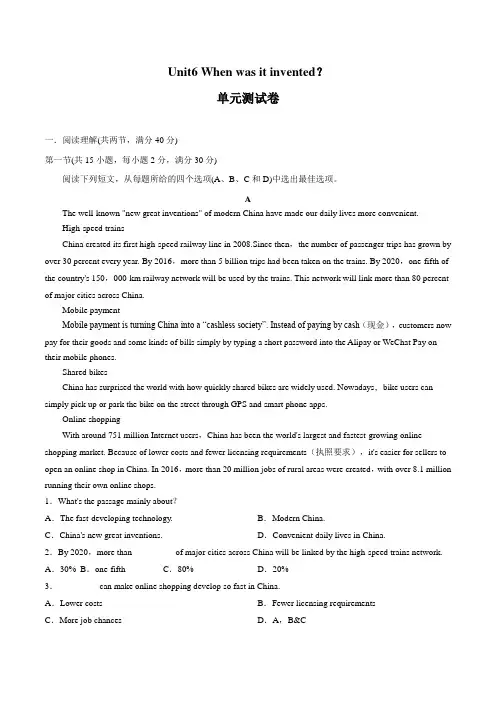
Unit6 When was it invented?单元测试卷一.阅读理解(共两节,满分40分)第一节(共15小题,每小题2分,满分30分)阅读下列短文,从每题所给的四个选项(A、B、C和D)中选出最佳选项。
AThe well-known "new great inventions" of modern China have made our daily lives more convenient.High-speed trainsChina created its first high-speed railway line in 2008.Since then,the number of passenger trips has grown by over 30 percent every year. By 2016,more than 5 billion trips had been taken on the trains. By 2020,one-fifth of the country's 150,000-km railway network will be used by the trains. This network will link more than 80 percent of major cities across China.Mobile paymentMobile payment is turning China into a “cashless society”. Instead of paying by cash(现金),customers now pay for their goods and some kinds of bills simply by typing a short password into the Alipay or WeChat Pay on their mobile phones.Shared bikesChina has surprised the world with how quickly shared bikes are widely used. Nowadays,bike users can simply pick up or park the bike on the street through GPS and smart phone apps.Online shoppingWith around 751 million Internet users,China has been the world's largest and fastest-growing online shopping market. Because of lower costs and fewer licensing requirements(执照要求),it's easier for sellers to open an online shop in China. In 2016,more than 20 million jobs of rural areas were created,with over 8.1 million running their own online shops.1.What's the passage mainly about?A.The fast-developing technology. B.Modern China.C.China's new great inventions. D.Convenient daily lives in China.2.By 2020,more than _________ of major cities across China will be linked by the high-speed trains network. A.30% B.one-fifth C.80% D.20%3._________ can make online shopping develop so fast in China.A.Lower costs B.Fewer licensing requirementsC.More job chances D.A,B&CBNobody knows who invented the pencil or when it was invented. A Swiss described a pencil in a book in 1565. He said it was a piece of wood with lead(铅)inside it. In 1795,someone started making pencils from graphite(石墨)and they became very popular. Today,people make pencils in the same way. They put it inside a piece of wood. One pencil can make a line as long as 55 kilometers.When people wrote with pens,they had to put the pen point into the ink after writing every few letters. Later someone invented a fountain pen(自来水笔)and this kind of pen could hold ink inside it. A fountain pen can write several pages before you have to fill it again.Two brothers,Ladislao and Georg Biro,invented the ballpoint pen that we all use today. They left their country Hungary and started producing ballpoint pens in England in 1943 during the World War Ⅱ. Later,a French company called Bic bought the Biro brothers' company. Someone calls ballpoint pens bics. Australians call them biros. Whatever they are called,we use them every day.1.When was the pencil invented according to the passage?A.In 1565. B.In 1795. C.In1943. D.Before1565.2.What does the underlined word “pen point” mean in Chinese?A.笔杆B.笔帽C.笔尖D.笔筒3.Where were Ladislao and Georg Biro from?A.America. B.Australia. C.Hungary. D.England.4.What is the passage mainly about?A.Some famous inventors.B.The invention of pencils and some kinds of pens.C.Who invented the pencil.D.Which kind of pen is the most useful.CHave you ever seen a car without a driver? It sounds crazy, but these computer-driven driverless cars will soon be filling roads near you. Companies like Google and Tesla have been designing and testing these cars, and the technology is there.So how? The cars have sensors(感应器)all around which can find other cars and objects in the road.Road signs are read by cameras, and satellite navigation systems(卫星导航系统)are used so the car knows how to get where you want to go. All you have to do is type in the address! Finally, a central computer system takes in all the information that it receives from the sensors and cameras and works out when to speed up, stop and turn.Sound like your idea of heaven(天堂)? Sitting back, looking out of the windows and even watching a film or reading a book while “driving” would be possible with this new technology. You wouldn’t have to worry aboutremembering directions to where you’re going. In addition, computers would also drive more safely than people—they would obey the rules and have quicker action times when in dangerous situations.However, there are many drawbacks of driverless cars. Computers would have difficulties making ethical(道德的)decisions: if a child ran into the road, would the computer choose to hit the child or turn suddenly and potentially kill the car’s passengers? Moreo ver, I personally find driving fun—I’d miss never driving a car myself. There would also be many other decisions to be made—should children, or drunk people, be allowed in a driverless car by themselves? Or would there need to be a person with a driving license in the car at all times?I’m not certain I’d want a driverless car—but it’s only a matter of time before they’ll become more affordable and popular on our roads.1.When using a driverless car, you need only .A.read the road signs carefullyB.check the camerasC.put the address into the computerD.remember the directions2.The third paragraph mainly tells us about the of driverless cars.A.instructionsB.standardsC.advantagesD.tests3.The u nderlined word “potentially” in Paragraph 4 means “”.A.possiblyB.successfullyC.especiallyD.naturally4.What’s the writer’s opinion about future driverless cars?A.They’ll cause more accidents.B.They’ll be less expensive.C.They’ll use less energy.D.They’ll run much faster.DClass Afloat is a Canadian school on a tall ship! The ship is 210 feet long and 30 feet wide, and it can take up to sixty students. The classrooms are well-equipped and comfortable, and there’s even a library! It isn’t necessary to know anything about sailing—students can learn on the ship.Not all the students are Canadian. There’s usually a mix of nationalities. This year, there are also students fromMexico, the US, Germany, and Turkey. There’s a mix of ages too. Th ere are high school students sixteen to eighteen years old, and first-year college students.The teachers design special study programs for each student. Because the school is a ship, you can do some exciting classes, for example, Marine Biology(studying the animals and plants in the sea) and History of Geography courses about the places you visit. Students also learn all about sailing!Students don’t just study. They must also clean, cook, and sail the ship. In their free time, students can rest, read, or watch a movie. In the evenings, they relax with friends and have club meetings.Every sixteen to twenty days, the ship stops in a port for three to six days. In port there’s lots for the students to do—homestays, camping trips, museum tours, cultural events, hiking, etc. They also go boating and do other water sports. Parents can meet up with the students in one port every term.Students also take part in two volunteer programs in Senegal and the Dominican Republic. They help local families in different ways, for example, with basic health matters or starting a business. Students learn how, with just a little money and time, they can make changes that improve other people’s lives.1.In Paragraph 2 we can get the information about .A.the shipB.the studentsC.the classesD.the activities2.Which of the following statements is true?A.Students must know how to sail before they join the ship.B.All the students take the same classes together.C.Students go home to see their parents on holidays.D.Besides studying, students also have to do jobs on the ship.3.Why are students required to take part in the volunteer projects?A.They can learn how to help others.B.They can learn how to make money.C.They can learn how to start a business.D.They can learn how to do medical practice.4.The passage is mainly about .A.learning to sail a tall shipB.sailing around the worldC.a school on a sailing shipD.after-school activities第二节(共5小题,每小题2分,满分10分)下面文章中有五处(第1-5题)需要添加小标题。
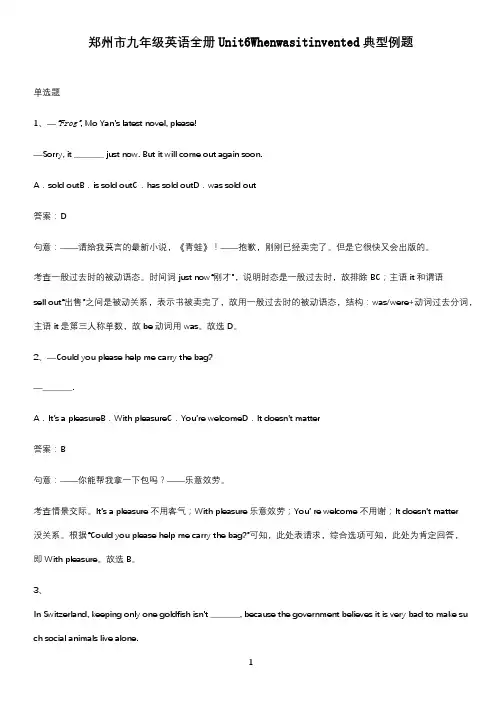
郑州市九年级英语全册Unit6Whenwasitinvented典型例题单选题1、—“Frog”, Mo Yan's latest novel, please!—Sorry, it ________ just now. But it will come out again soon.A.sold outB.is sold outC.has sold outD.was sold out答案:D句意:——请给我莫言的最新小说,《青蛙》!——抱歉,刚刚已经卖完了。
但是它很快又会出版的。
考查一般过去时的被动语态。
时间词just now“刚才”,说明时态是一般过去时,故排除BC;主语it和谓语sell out“出售”之间是被动关系,表示书被卖完了,故用一般过去时的被动语态,结构:was/were+动词过去分词,主语it是第三人称单数,故be动词用was。
故选D。
2、—Could you please help me carry the bag?—________.A.It’s a pleasureB.With pleasureC.You’re welcomeD.It doesn’t matter答案:B句意:——你能帮我拿一下包吗?——乐意效劳。
考查情景交际。
It’s a pleasure不用客气;With pleasure乐意效劳;You’ re welcome不用谢;It doesn’t matter没关系。
根据“Could you please help me carry the bag?”可知,此处表请求,综合选项可知,此处为肯定回答,即With pleasure。
故选B。
3、In Switzerland, keeping only one goldfish isn’t ________, because the government believes it is very bad to make su ch social animals live alone.A.stoppedB.doubtedC.refusedD.allowed答案:D句意:在瑞士,只养一条金鱼是不允许的,因为政府认为让这些群居动物独自生活是非常不好的。
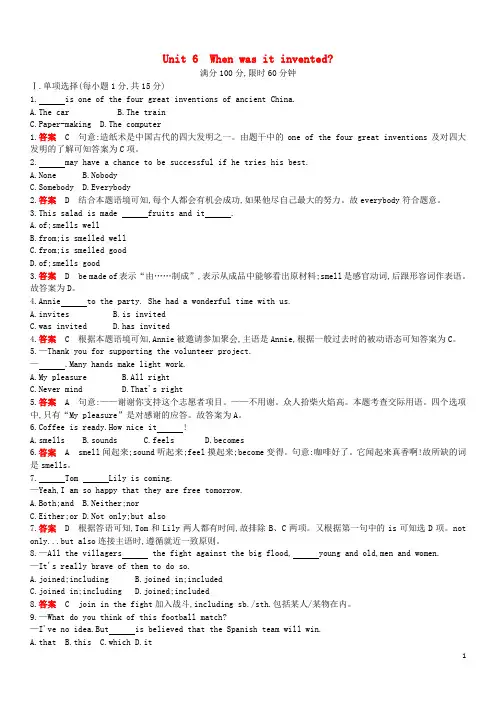
Unit 6 When was it invented?满分100分,限时60分钟Ⅰ.单项选择(每小题1分,共15分)1. is one of the four great inventions of ancient China.A.The carB.The trainC.Paper-makingD.The computer1.答案 C 句意:造纸术是中国古代的四大发明之一。
由题干中的one of the four great inventions及对四大发明的了解可知答案为C项。
2. may have a chance to be successful if he tries his best.A.NoneB.NobodyC.SomebodyD.Everybody2.答案 D 结合本题语境可知,每个人都会有机会成功,如果他尽自己最大的努力。
故everybody符合题意。
3.This salad is made fruits and it .A.of;smells wellB.from;is smelled wellC.from;is smelled goodD.of;smells good3.答案 D be made of表示“由……制成”,表示从成品中能够看出原材料;smell是感官动词,后跟形容词作表语。
故答案为D。
4.Annie to the party. She had a wonderful time with us.A.invitesB.is invitedC.was invitedD.has invited4.答案 C 根据本题语境可知,Annie被邀请参加聚会,主语是Annie,根据一般过去时的被动语态可知答案为C。
5.—Thank you for supporting the volunteer project.—.Many hands make light work.A.My pleasureB.All rightC.Never mindD.That's right5.答案 A 句意:——谢谢你支持这个志愿者项目。
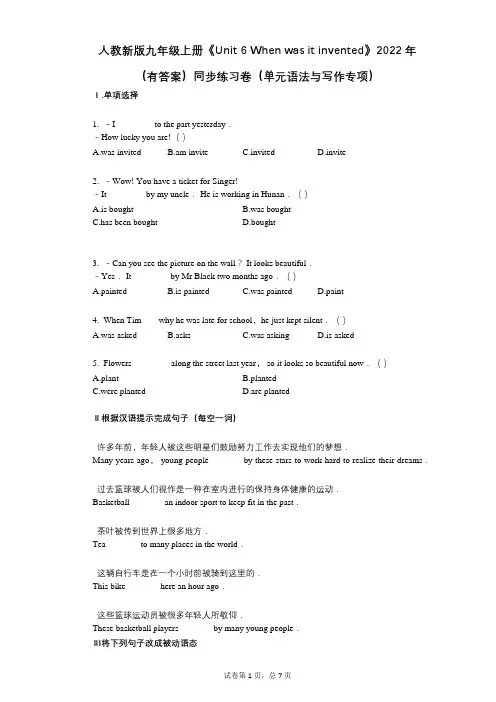
人教新版九年级上册《Unit 6 When was it invented》2022年(有答案)同步练习卷(单元语法与写作专项)Ⅰ.单项选择1. ﹣I ________ to the part yesterday.﹣How lucky you are!()A.was invitedB.am inviteC.invitedD.invite2. ﹣Wow! You have a ticket for Singer!﹣It ________ by my uncle. He is working in Hunan.()A.is boughtB.was boughtC.has been boughtD.bought3. ﹣Can you see the picture on the wall? It looks beautiful.﹣Yes. It ________ by Mr Black two months ago.()A.paintedB.is paintedC.was paintedD.paint4. When Tim ___ why he was late for school,he just kept silent.()A.was askedB.asksC.was askingD.is asked5. Flowers ________ along the street last year, so it looks so beautiful now.()A.plantB.plantedC.were plantedD.are plantedⅡ根据汉语提示完成句子(每空一词)许多年前,年轻人被这些明星们鼓励努力工作去实现他们的梦想.Many years ago, young people________by these stars to work hard to realize their dreams.过去篮球被人们视作是一种在室内进行的保持身体健康的运动.Basketball________an indoor sport to keep fit in the past.茶叶被传到世界上很多地方.Tea________to many places in the world.这辆自行车是在一个小时前被骑到这里的.This bike________here an hour ago.这些篮球运动员被很多年轻人所敬仰.These basketball players________by many young people.Ⅲ将下列句子改成被动语态The villagers built a new bridge last year.(改为被动语态)________We didn't find the lost dog at Last.(改为被动语态)________Did they finish the work last night?(改为被动语态)________My father bought me a new car.(改为被动语态)________I saw them come in.(改为被动语态)________写作【话题分析】本单元围绕发明创造展开,介绍了茶和篮球的起源,对学生了解科学知识很有帮助.【写作目标】能正确运用被动语态,结合本单元所学的词汇及语法介绍对我们的生活产生影响的发明创造.【写作任务】中国的"新四大发明"(高铁、线上支付、共享单车和网购)和我们的日常生活息息相关.请你从"新四大发明"中选出一种,写一篇英语作文,谈谈它如何影响着你的生活.要点:(1)挑选你最熟悉的一项"发明";(2)谈谈它如何影响着你的生活;(3)说明它是否对人们生活有消极的影响,如果有,请简述消极影响有哪些;(4)说明人们应该如何更好地应用这些"发明".注意:(1)文章包含以上要点;(2)行文连贯,条理清晰;(3)词数:80词左右.________.【提分佳句】(1)Almost every Chinese has heard of the four great inventions of ancient China.(2)When tourism becomes more and more popular, high﹣speed trains are people's first choice to travel.(3)People can pay for almost everything by Alipay and WeChat Pay.(4)People only need to scan the QR code and then they can ride the bike to the place where they want to go.(5 )Online shopping means people can buy their favorite things online without steppingout of the doors.参考答案与试题解析人教新版九年级上册《Unit 6 When was it invented》2022年(有答案)同步练习卷(单元语法与写作专项)Ⅰ.单项选择1.【答案】A【考点】一般过去时的被动语态【解析】﹣我昨天被邀请去参加聚会.﹣你可真幸运!【解答】根据题干,可知空处所在句主语I与动词invite之间为被动关系,且根据时间状语yesterday 可知用一般过去时的被动语态were/was+过去分词.主语I 接was.故选:A.2.【答案】B【考点】一般过去时的被动语态【解析】﹣哇!你有一张《歌手)的门票.﹣它是我叔叔买的.他在湖南工作.【解答】结合语境可知此处主语It与动词buy之间为被动关系,且动作发生在过去,应用一般过去时的被动语态.动词构成是was/were+过去分词.主语it接was.故选:B.3.【答案】C【考点】一般过去时的被动语态【解析】﹣你能看到墙上的那幅画吗?它看起来很美.﹣是的.它是布莱克先生两个月前画的.【解答】根据题干,可知主语是动作的承受者,用被动语态.由two months ago,可知此处应用一般过去时的被动语态.主语it接was.动词构成是was+过去分词.故选:C.4.【答案】A【考点】一般过去时的被动语态时态辨析【解析】当Tim 被问到他为什么上学迟到时,他只是保持沉默.【解答】答案:A 结合选项中的ask 一词并结合句意可判断出Tim 是被问的对象,是谓语动词ask 的动作承受者,所以此处应该用被动语态,其结构为be+动词的过去分词;又由于后面主句中的关键词kept,所以主从句的时态要保持一致要用一般过去时,意为过去发生的事.综合以上的分析,可知此处应该用一般过去时的被动语态,因为主语是单数Tim,所以be 变为was 加ask 的过去分词asked.故选:A.5.【答案】C【考点】一般过去时的被动语态【解析】去年沿街都种满了花,所以它现在看起来很漂亮.【解答】根据题干,可知主语是动作的承受者,用被动语态.由last year可知应用一般过去时的被动语态.主语是复数,用were+过去分词.故选:C.Ⅱ根据汉语提示完成句子(每空一词)【答案】wereencouraged【考点】汉译英【解析】Many years ago, young people were encouraged by these stars to work hard to realize their dreams.【解答】根据题干,可知,be encouraged by被…鼓励.主要短语是:由many years ago可知时态是一般过去时.主语people接were.故答案为were encouraged.【答案】wasregardedas【考点】汉译英【解析】Basketball was regarded as an indoor sport to keep fit in the past.【解答】根据题干,可知考查:be regarded as被视作……由句意可知时态是一般过去时.主语是单数,用was.故答案为was regarded as.【答案】wasspread【考点】汉译英【解析】Tea was spread to many places in the world.【解答】spread传播,主语tea是spread的承受者,根据句意可知用一般过去时的被动语态.故答案是was spread.【答案】wasridden【考点】汉译英【解析】This bike was ridden here an hour ago.【解答】ride骑,主语this bike是ride的承受者,根据an hour ago可知用一般过去时的被动语态.故答案是was ridden.【答案】arelookedupto【考点】汉译英【解析】These basketball players are looked up to by many young people.【解答】look up to敬仰,主语These basketball players 是look up to的承受者,根据句意用一般现在时的被动语态.故答案是are looked up to.Ⅲ将下列句子改成被动语态【答案】Anewbridgewasbuiltbythevillagerslastyear【考点】句型转换【解析】村民们去年建了一座新桥.去年一座新桥被村民们建造.【解答】根据题干,原句中的宾语a new bridge变成主语,主语the villagers变成宾语.时态是一般过去时,主语doga new bridge是可数名词单数形式,故动词用was+过去分词.故答案为A new bridge was built by the villagers last year.【答案】The lost dog wasn't found by us at last.【考点】句型转换【解析】我们最后还是没有找到丢失的狗.丢失的狗最终没有被我们找到.【解答】根据题干,原句中的宾语the lost dog变成主语,主语we变成宾语,用宾格them.时态是一般过去时,主语dog是可数名词单数形式,故动词用was+过去分词.故答案为The lost dog wasn't found by us at last.【答案】Was the work finished by them last night?【考点】句型转换【解析】他们昨晚完成工作了吗?昨晚工作被他们完成了吗?【解答】根据题干,原句中的宾语the work变成主语,主语they变成宾语,用宾格them.时态是一般过去时,work是不可数名词,故动词用was+过去分词.句子是一般疑问句,把was提到句首.故答案为Was the work finished by them last night?【答案】Anewcarwasboughtformebymyfather【考点】句型转换【解析】A new car was bought for me by my father.【解答】根据题干,原句中的宾语a new car变成主语.原来的主语变成宾语.被动语态的动词构成是be+过去分词.时态是一般过去时.主语是单数,用was.sth was bought for sb by sb某物被某人买给某人.故答案为A new car was bought for me by my father.【答案】They were seen to come in by me.【考点】句型转换【解析】They were seen to come in by me.【解答】根据题干,原句中的动词saw是实义动词过去式,原来的them变成主语they,变成被动语态的结构是:were+过去分词.be seen to do sth by sb被某人看到做某事.They were seen to come in by me.写作【答案】Shared bikes are regarded as one of the new great inventions in China. It makes our life more convenient and it is also environmentally friendly.【高分句型一】(点题)Shared bikes are thought to appear in 2014. Since then,people have had a new way of public transportation, and it is really good for short﹣distance trips. The bikes cost you a little,and you can find them in nearly every street. Because of them,you will not be bothered by the traffic jam in the rush hour.【高分句型二】On the other hand, shared bikes also bring us trouble. We often find the bikes are broken or ruined by someone. So they are not beautiful scenery anymore, but a kind of trash.(共享单车的优缺点)As far as I am concerned, we should make some regulations or rules to guide people to use the shared bikes properly and do not treat them as rubbish.(我的观点)【考点】提纲作文【解析】【高分句型一】It makes our life more convenient and it is also environmentally friendly.它使我们的生活更方便,它也是环保的.make sb/sth+形容词,使某人/某物……【高分句型二】Because of them,you will not be bothered by the traffic jam in the rush hour.因为有了他们,你就不会在上下班高峰期被交通堵塞所困扰了.because of因为……【解答】Shared bikes are regarded as one of the new great inventions in China. It makes our life more convenient and it is also environmentally friendly.【高分句型一】(点题)Shared bikes are thought to appear in 2014. Since then,people have had a new way of public transportation, and it is really good for short﹣distance trips. The bikes cost you a little,and you can find them in nearly every street. Because of them,you will not be bothered by the traffic jam in the rush hour.【高分句型二】On the other hand, shared bikes also bring us trouble. We often find the bikes are broken or ruined by someone. So they are not beautiful scenery anymore, but a kind of trash.(共享单车的优缺点)As far as I am concerned, we should make some regulations or rules to guide people to use the shared bikes properly and do not treat them as rubbish.(我的观点)。
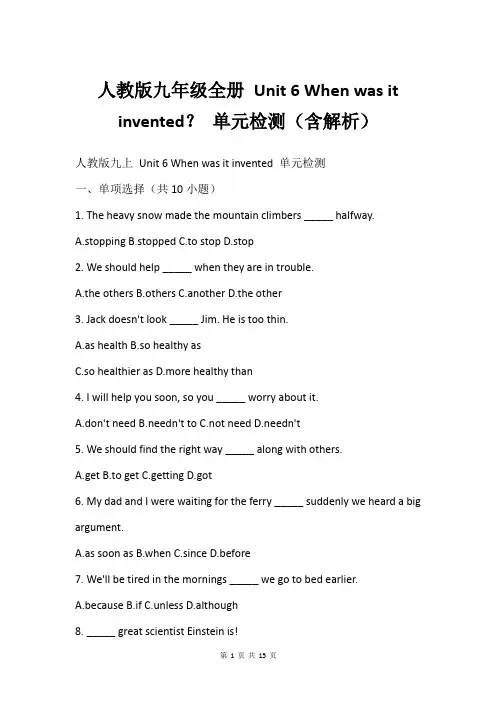
人教版九年级全册Unit 6 When was it invented?单元检测(含解析)人教版九上Unit 6 When was it invented 单元检测一、单项选择(共10小题)1. The heavy snow made the mountain climbers _____ halfway.A.stoppingB.stoppedC.to stopD.stop2. We should help _____ when they are in trouble.A.the othersB.othersC.anotherD.the other3. Jack doesn't look _____ Jim. He is too thin.A.as healthB.so healthy asC.so healthier asD.more healthy than4. I will help you soon, so you _____ worry about it.A.don't needB.needn't toC.not needD.needn't5. We should find the right way _____ along with others.A.getB.to getC.gettingD.got6. My dad and I were waiting for the ferry _____ suddenly we heard a big argument.A.as soon asB.whenC.sinceD.before7. We'll be tired in the mornings _____ we go to bed earlier.A.becauseB.ifC.unlessD.although8. _____ great scientist Einstein is!A.HowB.How aC.WhatD.What a9. _____ the man was badly injured in the fire, he is still alive now.A.SinceB.WhenC.BeforeD.Although10. A large number of people are keen on planting online vegetables recently, _____A.don't theyB.do theyC.aren't theyD.are they二、完形填空(共1小题)What will life be like in 3,000 years Different people have _____ answers. Here is my answer.I think life will be very different in 3,000 years. Every family will have _____ robot. The robot can do everything for people. _____ people won't have to do heavy and _____ work. And they _____ more free time to enjoy the things they like.People will wear special _____ in 3,000 years. They don't have to _____ clothes because they won't get dirty. There will be more kinds of foods for people to enjoy. And they are all healthy food.People will use energy (能量) from the sun and the wind. So there _____ be any pollution (污染) problems.People will use a special car to travel. It can run on the road and _____ in the air. It will be very _____ for people to travel to the moon and other planets (行星) . Some people will live on other planets.It will be a happy world in 3,000 years.11. A.same B.different C.much D.few12. A.a B.an C.the D./13. A.With B.So C.But D.Since14. A.light B.funny C.interesting D.difficult15. A.have B.don't have C.will have D.won't have16. A.jacket B.dress C.pants D.clothes17. A.have B.wear C.wash D.make18. A.is B.isn't C.will D.won't19. A.walk B.fly C.climb D.sleep20. A.easy B.happy C.hard D.far三、阅读选择(共3小题)I'm Sally. My grandparents live in a nice neighborhood. It's an interesting place to visit. I like to spend time there on weekends.I often walk along Main Street to get there. There is an old building in the center of the neighborhood. It's a library. It's about 150 years old and lots of people like to read books there. There is a red building across from the library. It's an old post office. It's about 100 years old. Next to it, there is a supermarket.My favorite in the neighborhood is Walking Street. There are many small restaurants on this street. I like to eat all kinds of delicious snacks (小吃). There is a park behind Walking Street. My grandparents always walk around in the park every afternoon. It's nice and quiet, and they canenjoy the clean air and sunshine.21. How does Sally often go to her grandparents' homeA.By bike.B.On foot.C.By bus.D.By car.22. The library is about _____ years old.A.150B.130C.120D.10023. There is a _____ next to the post office.A.schoolB.hotelC.hospitalD.supermarket24. Where is the parkA.On Main Street.B.Next to the library.C.Behind Walking Street.D.Across from the post office.25. What do Sally's grandparents always do in the afternoonA.Read books in the library.B.Shop in the supermarket.C.Walk around in the park.D.Watch TV at home.As we know, Meizhou Island is a famous place of interest in Putian. My pen pal Sam from Australia would like to visit it very much. He is coming here for a holiday next week. He is planning to stay here for seven days. He has never come to Putian before, so he needs to know something about it. The weather is the most important thing that he would like to know. He wants to know what he should get ready for the trip and what kinds of clothes he has to take with him. Here is the seven-day weather report for Putian.Date Weather TemperatureJuly 1st 27℃~35℃July 2nd 26℃~33℃July 3rd 26℃~32℃July 4th 28℃~36℃July 5th 29℃~37℃July 6th 27℃~34℃July 7th 28℃~34℃26. How long will Sam stay in PutianA.Two days.B.Five days.C.A week.D.A month.27. What information does Sam most want to knowA.The food in Putian.B.The history of Putian.C.The traffic in Putian.D.The weather in Putian.28. What will the weather be like on July 5thA.Sunny.B.Cloudy.C.Windy.D.Rainy.29. On July 3rd, the highest temperature is _____.A.26℃B.28℃C.32℃D.36℃30. What do you think Sam should wear when he stays in Putian A.B.C.D.Why Do the English Always Talk about the WeatherIt's nearly June and the people in London are still wearing the winter jackets! Don't you think the weather in London is so bad at the moment But when the sun comes out in the late afternoon, it will be summer at this time of a day. When you go to England, you will (将要) see that some English people usually take an umbrella or a raincoat with them on a sunny morning, but you should not laugh at them. If you don't take an umbrella or a raincoat, you will regret later in the day.So when you meet English people, they often talk about one thing, the weather. You can say, "Nice weather for the time of year!""But it was a little cold yesterday," somebody may answer."But it got a bit warmer later!" you can say.Talk like this, and the English will think, how friendly you are! Talking about the weather can mean more than just trying to make a conversation with a stranger. The weather is everywhere and it affects everyone, so if you meet a stranger or if you are introduced to someone, it is the perfect way to start a conversation!31. What does "regret" meanA.后悔B.惊讶C.理解D.期待32. In England, you'd better _____ on a sunny day.A.wear sunglassesB.ride a bikeC.take an umbrellaD.listen to the weather report33. It is very _____ to talk about the weather with a stranger.A.strangeB.impoliteC.rudeD.friendly四、阅读回答问题(共1小题)Most children don't enjoy doing housework. They like playing computer games rather than cleaning the rooms. But in Australia, Jim and Robert's mother, Mrs. Black, has good and proper methods to get their children to do housework.Here is an example."Mum, have you worked out next week's housework Let Jim and me choose the cards. I can't wait. It's fun!"When Robert shouted out, his mother had already put all the cards on their big table. On the cards, there are some words like these:" sweep the floor, clean your bedroom, help mum cook, wash vegetables, make beds, feed the fish, cut the wood, clean the bathroom" and many others. Jim and Robert chose two cards for each day from Monday to Friday. Then they would hang them on the weekday task board. Jim likes to clean the bathroom, so he picked up the card "clean the bathroom". Robert loves to make the bed so he picked up his favorite card. Jim again picked up "wash vegetables" and Robert chose "feed the fish". Soon the two boys were happy to take away all the cards.To help the children do housework, their mother thought hard and came up with this idea. Of course, the parents did the housework on the weekends and left Jim and Robert two days free.34. Where do Jim and Robert come from35. How many cards did Jim and Robert choose from every week36. Where do Jim and Robert hang the cards37. What housework does Robert like most38. When don't Jim and Robert need to do housework五、句子填空(共2小题)glass he hobby dance one39. My _____ are playing basketball and singing.40. The woman with a pair of black _____ is our new Chinese teacher.41. His cousin doesn't like _____, but she does well in singing.42. We are now having a test for the _____ unit.43. —What's _____ name—His name is Hawking.not be listen love read have44. The little girl _____ taking photos. She often shows us her photos.45. Everyone in our class _____ an English storybook. We all like stories.46. Sue and I _____ in the same grade. Sue is in Grade 7, but I am in Grade 8.47. Daniel likes _____ very much. He goes to the library twice a week.48. Boys and girls, let's be quiet and _____ to music.六、书面表达(共1小题)49. 假如你们学校要举行以“优秀不是一种行为,而是一个习惯”为主题的英语演讲比赛。
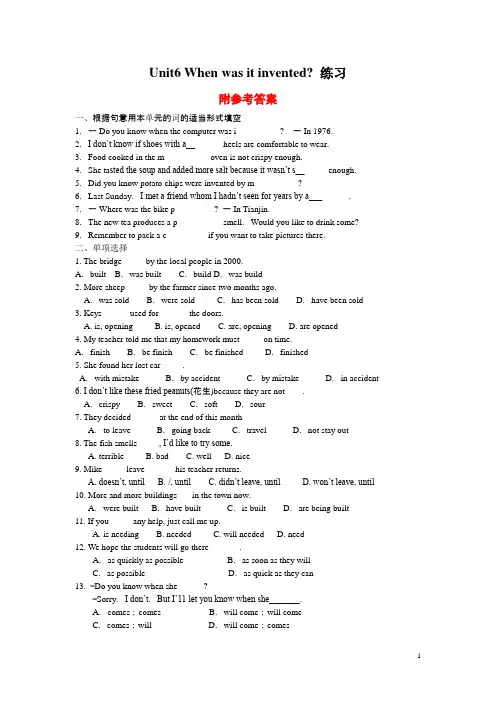
Unit6 When was it invented? 练习附参考答案一、根据句意用本单元的词的适当形式填空1.一Do you know when the computer was i__________? 一In 1976.2.I don’t know if shoes with a________ heels are comfortable to wear.3.Food cooked in the m__________ oven is not crispy enough.4.She ta sted the soup and added more salt because it wasn’t s_______ enough.5.Did you know potato chips were invented by m__________?6.Last Sunday.I met a friend whom I hadn’t seen for years by a_________.7.一Where was the bike p_________? 一In Tianjin.8.The new tea produces a p__________ smell.Would you like to drink some? 9.Remember to pack a c_________ if you want to take pictures there.二、单项选择1. The bridge_____ by the local people in 2000.A.built B.was built C.build D.was build2. More sheep_____ by the farmer since two months ago.A.was sold B.were sold C.has been sold D.have been sold3. Keys______ used for ______ the doors.A. is, openingB. is, openedC. are, openingD. are opened4. My teacher told me that my homework must_____ on time.A.finish B.be finish C.be finished D.finished5. She found her lost car_____.A.with mistake B.by accident C.by mistake D.in accident 6. I don’t like these fried peanuts(花生)because they are not____.A.crispy B.sweet C.soft D.sour7. They decided______ at the end of this monthA.to leave B.going back C.travel D.not stay out8. The fish smells_____, I’d like to try some.A. terribleB. badC. wellD. nice9. Mike _____leave ______ his teacher returns.A. doesn’t, untilB. /, untilC. didn’t leave, untilD. won’t leave, until10. More and more buildings___ in the town now.A.were built B.have built C.is built D.are being built11. If you_____ any help, just call me up.A. is needingB. neededC. will neededD. need12. We hope the students will go there_______.A.as quickly as possible B.as soon as they willC.as possible D.as quick as they can13. —Do you know when she______?—Sorry.I don’t.But I’11 let you know when she_______.A.comes;comes B.will come;will comeC.comes;will D.will come;comes14. I thought I___ the door,but it is still open.A.had closed B.was closing C.have closed D.would close15. 一Can you tell me where Jim is? --He______ his homework upstairsA.might have done B.must have done C.must be doing D.must do16. Let’s put off the picnic till next week,____ the weather may be better then.A.then B.if C.as D.when17. He will come back,but he doesn’t know_____.A.When he comes back B.when will he come backC.why to come back D.how he comes back18. 一Thank you very much for the meal.一Not at all.______.A.I’m very glad to hear that B.I’m glad you could comeC.Make yourself at home D.With pleasure19. In front of the library______ many pine trees.A. isB. hadC. standsD. stand20. There are some skyscrapers(摩天大楼)on ______ sides of the street, and____ of the skyscrapers is still growing year by year.A. both; a numberB. either; a numberC. both; the numberD. either; the number三、完成句子1.汽车是在1885年发明的。
Unit 6When was it invented?满分:100分,限时:60分钟Ⅰ.单项选择(每小题1分,共15分)1.I found Lisa's bag in the playground accident.I picked it up and returned it to her.A.forB.withC.ofD.by答案D by accident是固定搭配,意为“意外地”。
2.(2017海南海口十四中期中) Our teachers were very happy because failed the exam.A.somebodyB.anybodyC.nobodyD.someone答案C根据题干中的“我们的老师很高兴”可推断,没有人考试不及格,故所缺的词是nobody。
3.These oranges look nice, but very sour.A.feelB.tasteC.soundD.look答案B句意:这些橘子看起来很好,但是尝起来很酸。
本题考查动词词义辨析。
feel感觉起来;taste尝起来;sound 听起来;look看起来。
根据题意可知选B。
4.—Can you help me think of an idea?—. Let me think.A.With pleasureB.No wayC.Never mindD.That's right答案A本题考查交际用语。
问句问的是“你能帮我想一个办法吗”,合适的答语是With pleasure。
5.The Summer Olympic Games of 2020 will in Tokyo.A.take afterB.take offC.take placeD.take away答案C本题考查take的短语。
表示“举行”要用take place,故答案为C。
6.—Have you heard of Xu Yuanchong?He has ever won world's highest honor in translation.—Of course. Many famous poems in ancient China were into English by him.A.dividedB.producedC.packedD.translated答案D四个选项的含义分别是:divide分割;produce制造;pack把……打包;translate翻译。
Unit 6 When was it invented?词汇学习和练习附参考答案Key Phrases1. be invented in+时间/ 地点被发明于某年某地be invented by sb被某人发明的shoes with special heels有特殊鞋跟的鞋子2. shoes with lights有灯的鞋子see in the dark 在黑暗中看路3. be used for doing sth = be used to do sth被用来做某事(表用途)be used as 被当作……使用(强调当作工具或手段使用)be used by sb . 被某人使用(强调使用者)4. change the style of the shoes改变鞋子的样式/款式5. hot ice-cream scoop冰激凌加热勺6. change the world改变世界think of =come up with想出7. so great an invention=such a great invention 如此了不起的一项发明8. my pleasure乐意效劳,不用谢,别客气9. have a point说得有理10. think about考虑;思考11. in our daily lives在我们的日常生活中12. the pioneers of different inventions不同发明物的先锋/先驱者13. be listed被列清单14. at that time在那时15. be used widely被广泛使用16. become popular变得流行17. spread to sp传播到某地18. by accident= by chance偶然;意外地be the first person to do sth. 第一个做某事的人19. it is said that clause 据说…… It is believed that clause人们相信It is said that clause据说It is reported that clause据报道It is thought that clause人们认为It is heard that clause听说aChinese rulers called Shen Nong一个叫神农的统治者20. drinking water 饮用水over an open fire在野外的炉火上21. fall into.= drop into掉入22. for some time一段时间produce a nice smell 产生/散发出一股香味remain there 留在那里23. the saint of tea茶圣24.the finest tea leaves最好的茶叶.make tea 沏茶/泡茶25. be brought to SP.被带到某地be brought to the Western world被传到西方世界26. during the 6th and 7th centuries在六至七世纪间27. not... until...直到……才…… 31.less than… 不到…,少于…in less than 100 years在不到100年的时间里ove.=more than 多于32. the national drink全国性的饮品33.from China to Western countries 从中国到西方国家take place发生(无被动语态)34. even though=even if 即使the popularity of tea 茶的普及35. without doubt毫无疑问36. the nature of tea茶的本质tea culture 茶文化37. daily life = everyday life 日常生活38. at a low price 以低的价格39. stealsth. from sb./ sp. 从某人/某地偷东西40. advise sb. (not) to do sth建议某人(别)做某事41. translate... into… 把……翻译成……42. all of a sudden= suddenly突然;冷不防43. ring the bell 按铃break the rules 违反规定follow the rule 遵守规定a safe place一个安全的地方44. musical notes音符;音律45. potato chips 薯条by mistake错误地make mistakes in sth在某事上犯错mistake A for B 错把A当成B 46. make the customer happy使顾客髙兴salty enough 够咸enough salt 足够的盐47.in the end= at last =finally 最后at the end of…在…….末端/ 尽头100 million people一亿人48.for fun为了娱乐、消遣in history在历史上. in the1950s 在二十世纪五十年代49. on a hard floor在一块坚硬的地板上50. get a ball into the basket 把球投进篮子divide... into把......分成51. Stop sb./sth from doing sth阻止某人做某事/ 阻止某事发生.52. the number of... ……的数量(谓语动词用单数)a number of = many 许多(谓语动词用复数)atthe same time 同时53. look up to钦佩;仰慕54.encourage sb. to do sth.鼓励某人做某事not only... but also... 不仅……而且…… e up with = think up 想出56.become an Olympic event成为一项奥运会项目the popularity of … …的流行,普及57.achieve one’s dreams 实现某人梦想58. dream of doing sth梦想干某事一选择题( ) 1.Mo Yan is famous _______ an excellent writer. And China is famous ______ culture.A. for; asB. as; forC. because; asD. as; for( ) 2. --When will A Bite of China II begin tonight?--It ________ for ten minutes.A. will beginB. has begunC. will be onD. has been on( ) 3. Sixteen-year-olds shouldn’t ______ to go to an Internet bar.A. be allowedB. be allowC. allowD. are allowed( ) 4. ---I’m not hungry but thirsty.---________A I’m hungry, too.B What about some cakes?C I’m happy to hear that.D How about a glass of water?( ) 5.— We can use QQ to talk with each other online.— Really? Could you please show me _______ it?A. what to doB. how to doC. when to doD. why to do( ) 6.As we know, _____of us likes pollution.A. no oneB. noneC. someoneD. nothing( ) 7.—Lily, _____ you _____ your ticket?—Not yet!A. did; findB. have; foundC. has; foundD. do; find( ) 8.When we went into the park, we were saw _____ Chinese Kungfu.A. playsB. played C .to play D. playing( ) 9.The invention was Wednesday afternoon.A. invented,inB. invented ,onC. inventing,of D, invent,for( ) 10. --------Remember this , children .________ you study,________ knowledge you will get.--------We know, Mr. Green.A. The harder, the lessB. The hard, the moreC. The harder, the moreD. harder, more( ) 11. Our teacher told us that the eartharound the sun.A. wentB. goC. goesD. would go( ) 12. Our classroom _____ every day, so it’s very clean.A. cleansB. is cleaningC. is cleanedD. cleaned( ) 13. Would you like to tell me _________next, Mr. Feng?A. what should we doB. we should do whatC. what we should doD. should we do what ( ) 14.——How is your grandma? ——She’s fine. She used to _____TV at home after supper. But now she is used to _____out for a walk.A. watch; goB. watching; goC. watching; goingD. watch; going( ) 15.Windows _________ glass,the paper ________ bamboo. A. be made of , be made ofB. are made of , is made ofC. are made of ,is made fromD. are made from., is made of( ) 16. — My dream is to build university on the moon some day.— It sounds likeunusual dream. I wish you could realize it.A. a; aB. an; aC. a; anD. an; an( ) 17. I didn’t think maths _______ important at that time.A. isB. wereC. areD. was( ) 18.nice glasses! Where did you buy them?A. HowB. What aC. WhatD. How( ) 19. Excuse me, would you please tell me ______buy a digital camera on line?A. what to B .how to C. what I can D. how can I( ) 20. Someone says, “Money is everything.” But I think time is _____ important than moneyA. muchB. lessC. much leastD. even more( ) 21 ____ Jack ____ Jim has been to to China, but ___ of them knows little about China in fact.A. Either; or; bothB. Neither; nor; bothC. Not only; but also; neitherD. Both;and; neither( ) 22.We don't know _________ he will come tomorrow._________ he comes,We 'll tell you.A.if;Whether B.whether;Whether C.if;That D.if;If()23.The knife is used ________ cutting.A.for B.as C.by D./()24.—I'm very________ with my own cooking. It looks nice and smells delicious.—Mm, it does have a ________ smell.A.pleasant; pleased B.pleased; pleased C.pleasant; pleasant D.pleased; pleasant ()25.The song came to my ears ________ accident.A.by B.with C.in D.for()26.The meeting ________ last Sunday night.A.happening B.happened C.took place D. takes place()27.Who were the zippers invented ________?A.by B.for C.with D.at()28.—Thanks for the delicious food. —________.A.No, thanks B.That's right C.All right D.My pleasure()29.The corn, potato and tomato are plants that were first ______ in America by Columbus.A.invented B.grown C.discovered D.found out()30.The car ________ by the policeman because the driver was drunk (喝醉的).A.stopped B.was stopped C.were stopped D.stops二完形填空Some years ago, Chinese high school students would show their school-bags, new clothes or new pens to their classmates when the new term started, Today, however, all have 1 .If you still come back to school 2 only these things, you are falling out-of-date(过时). Students in big cities like to bring the latest high-tech things to school, and feel happy and 3 to show off(炫耀) these things to_4_. Mobile phones, MP3 players, CD players, electronic dictionaries, the list is endless.Young people think that, living in the twenty-first century, they must keep up with the _5. They don’t want to fall 6_ . Besides, they think _7_ they need to keep in touch with their classmates, so they need mobile phones. They also like to _8_ the pop music, so they need CD players. They explain that, 9_ like electronic dictionaries, these can be _10 in their study, 11 . They think that their parents should understand 12_ they want these things.Foreign students will also bring some latest high-tech things when they 13to school at the beginning of a new term. _14_ , they often use the money which they made by themselves during the holiday to 15_ these high-tech things that they want.( ) 1. A. changed B. come C. joined D. stopped ( ) 2. A. to B. from C. of D. with( ) 3. A. right B. lucky C. nice D. pleased ( ) 4. A. other B. the other C. others D. he others( ) 5. A. times B. days C. years D. date ( ) 6. A. down B. off C. behind D. back( ) 7. A. that B. how C. if D. which ( ) 8. A. hear B. listen to C. read D. play( ) 9. A. look B. just C. feel D. something ( ) 10. A. new B. modern C. latest D. useful( ) 11. A. also B. too C. either D. then ( ) 12. A. where B. which C. what D. why( ) 13. A. return B. return back C. reach D. arrive ( ) 14. A. But B. However C.So D. Still( ) 15. A. borrow B. buy C. lend D. take三首字母填空。
Unit6 When was it invented?单元综合测试听力部分(20分)Ⅰ.听句子,选择你听到的单词或短语。
(5分)( )1.( )2.( )3.( )4.( )5.Ⅱ.听小对话,选择正确的选项。
(5分)1. How does Mark feel the potato chips??A. Crispy and hot.B. Crispy and salty.C. Crispy and sweet.2. What did the girl take by mistake?A. Peter’s book.B. Peter’s pen.C. Mary’s pen.3. When was the new cell phone invented?A. In 2004.B. In 2005.C. In 2014.4. What does the man want to know?A. He wants to know who invented the machine.B. He wants to know when the machine was invented.C. He wants to know what the machine was used for.5. Who was the telephone invented?A. BenzB. BillC. Bell笔试部分Ⅳ. 单项选择(15分)1. ---was the light bulb invented_____?---Thomas Edison.A. When; inB. Who; byC. Whom; /D. What; for2. This apple is so _______that my teeth can’t stand it.A. softB. crispyC. saltyD. sour3. ----Did you go to Jim’s birthday party?----No, I .A. haven’t invitedB. didn’t inviteC. am not invitedD. wasn’t invited4. ---Do you know who the novel was by?---Of course. It’s Julia.A. madeB. createdC. producedD. invented5. The rabbit_______ the hole and couldn’t come out.A. fell intoB. fell offC. fell fromD. fell down6. It was already past midnight and only three young men in the tea house.A. keptB. leftC. remainedD. expected7. Yesterday I discovered his secret .A. by accidentB. in accidentC. by mistakeD. with mistake8. _____ is believed that Bell invented the first telephone in 1876.A. ThisB. ThatC. ItD. One9. It’s easy for kids to bad habits like smoking.A. put intoB. fall intoC. bring intoD. turn into10. The Chinese writer has got lots of fans in France. His new book _____into French as soon as it came out.A. was translatedB. translatedC. is translatedD. will translate11. _______ is waiting for you at the gate. He wants to say thanks to you.A. SomebodyB. AnybodyC. EverybodyD. Nobody12.The Great Green Wall can stop the wind and sand to the rich land in the south of China.A. moveB. to moveC. from movingD. to moving13.---A number of Hope schools were built around the country last year---Yes, them was over one hundred.A. was built; The number ofB. were built; The number ofC. was built; A number ofD. were built; A number of14. --- What do you think of the price of gold in the world?---Nowadays it is getting much than before.A. lowB. lowerC. cheapD. cheaper15. Jessica's parents always encourage her ____________out her opinions.A. speakB. speakingC. to speakD. will speakⅤ. 完形填空.(15分)Man has invented four kinds of satellites (卫星). The first kind of satellite studies the 1 of the earth. They are used to make maps. They also help countries to see where they may 2 oil or gold.The second kind of satellite is used to guide ships and planes. A ship or a plane can 3 a message to the satellite, and the satellite can find out 4 the ship or the plane is.The third kind studies the weather. These satellites 5 clouds and strong winds moving across the earth. They warn countries to make preparations (准备) when very 6 weather is coming. 7 kind is used for communication. Telephone calls 8 countries can be sent by these satellites. Some can carry hundreds of calls at the same time. The call is sent to the satellite, then the 9 sends it to a station in the country and this country is being phoned. These satellites also carry pictures; they can receive and send about eight 10 at a time.1. A. biology B. history C. physics D. geography2. A. study B. find C. carry D. choose3. A. write B. send C. take D. bring4. A. where B. which C. what D. that5. A. search B. watch C. notice D. see6. A. sunny B. cool C. fine D. bad7. A. The last B. Another C. One D. Any other8. A. during B. along C. between D. of9. A. TV B. telegraph C. telephone D. satellite10. A. plays B. programs C. films D. languagesⅥ. 阅读理解。
Unit 6测试卷附参考答案一、听力测试(25分)现在是试听时间。
请听一段对话,然后回答问题。
What is the boy going to buy?A. Some juice.B. Some oranges.C. Some apples.答案是C。
A)请听下面5段对话。
每段对话后有一小题,从题中所给的A、B、C三个选项中选出最佳选项,并在答题卷上将该项涂黑。
听完每段对话后,你都将有10秒钟的时间回答有关小题和阅读下一小题,每段对话读两遍。
(每小题1分)1. How is the weather in New York?A. It's cloudy.B. It's rainy.C. It's sunny.2. Where is the hotel?A. On the right.B. Next to the post office.C. Across from the post office.3. What's Paul doing?A. Reading.B. Smoking.C. Writing.4. Why is the woman worried?A. Because Tom may miss the train.B. Because the train is late.C. Because Tom has changed his plan.5. What does the man mean?A. It's hard to pass the exam.B. It's easy to pass the exam.C. They didn't work hard before.B)请听下面3段对话和2段独白。
每段对话或独白后有几个小题,从题中所给的A、B、C 三个选项中选出最佳选项,并在答题卷上将该项涂黑。
听每段对话或独白前你都将有30秒钟的时间阅读各小题。
每段对话或独白读两遍。
(每小题1分)请听第1段对话,回答第6至第7小题。
6. What are they going to do on Saturday?A. Play volleyball.B. Play tennis.C. Watch the tennis match.7. When are they going to meet?A. At 2:00.B. At 2:30.C. At 3:00.请听第2段对话,回答第8至第10小题。
8. How did Lily go to work today?A. On foot.B. By bus.C. By car.9. What will Mike do tomorrow?A. Visit Lily.B. Drive to work.C. Leave home earlier.10. Which of the following is true?A. Lily has a new flat.B. Lily was late for work.C. Mike lives close to the office.请听第3段对话,回答第11至第13小题。
11. Where does David spend time after school these days?A. At a coffee shop.B. At a library.C. At a music club.12. Whom does David like to meet?A. Classmates.B. Friends.C. Strangers.13. What can we get from the conversation?A. David doesn't like drinking coffee a lot.B. Mum knows much about David's girl friend.C. David would like to talk about girls with mum.请听第1段独白,回答第l4至第l6小题。
14. How old is Nancy?A. Fourteen.B. Fifteen.C. Sixteen.15. What does Nancy often do at weekends?A. She often visits her friends.B. She often goes to parties.C. She often does housework.16. What can we learn about Nancy?A. She has enough time for activities.B. She sometimes makes money by herself.C. She is tired of doing homework.请听第2段独白,回答第17至第20小题。
17. What's Bob going to do this summer holiday?A. Go to the English class.B. Learn to drive.C. Work as a waiter.18. Who will open a restaurant?A. Bob's uncle.B. Bob's father.C. Bob's friend.19. What makes Bob worried?A. Too much work.B. His poor English.C. The bad weather.20. Why is Bob calling Steve?A. To ask Steve for help.B. To talk about his school life.C. To invite Steve to go travelling with him.C)请听下面一段短文,根据短文内容完成表格,每个空格不超过3个单词。
将答案填写到答题卷的相应位置。
听短文前你将有50秒钟的时间阅读表格内容。
短文读两遍。
(每小题1二、单项选择26. — Is Yi Jianlian NBA player?— He used to be. But now he plays for Guangdong Southern Tigers in CBA.A. aB. anC. theD. \27. — How nice the fish !—Really? I am sure you’ll like it better if you try some.A. smellsB. feelsC. tastesD. sounds28. — The 20th World Cup in Brazil, right?— Yes. It this summer.A. held; took placeB. was held; was taken placeC. held; was taken placeD. was held; took place29. —Why don’t you buy a camera?— Do you think I need to? My phone is often used a camera.A. byB. forC. asD. with30. — How dangerous!— Yeah. The bus hit the car just now.A. clearlyB. normallyC. nearlyD. mostly31. — Why do many people buy things online on the 11th of November every year?— Because there are many sales. The prices are .A. much cheaperB. much lowerC. more expensiveD. much higher32. — Can we pick some oranges to eat?—Can’t you see that they are green? They must be .A. sweetB. saltyC. hotD. sour33. — I need something me with the housework.—Try this one. It’s used for the floor.A. to help; cleaningB. help; cleaningC. to help; cleanD. help; clean34.—If the Japanese football team had a match with the German football team, which do you think would win?— The German team would win without any . It’s a much better team.A. hopeB. secretC. interestD. doubt35. is said that Alexander Graham Bell invented one of the first practical telephones in 1876.A. ThisB. ThatC. OneD. It36. —The movie is over. Let’s go out.— Hey, just seated until all the lights are on.A. remainB. takeC. holdD. refuse37. — Was table tennis invented by the Chinese?— No. It in China until the start of the 20th century.A. playedB. was playedC. didn’t playD. wasn’t played38.— Do you know in ancient China?— I have no idea. But I know people once used tree leaves to make paper.A. how paper was madeB. how was paper madeC. what paper was madeD. what was paper made49. —Many thanks for what you’ve done for us.—.A. Don’t mention itB. Never mindC. That’s rightD. You seem to have a point40. — Michael Jacks on was called the king of pop, wasn’t he?— Of course. He by people all over the world.A. was looked upB. was looked up toC. looked upD. looked up to三、完型填空(共15分)通读下面短文,掌握其大意,然后在各小题所给的四个选项中,选出一个最佳答案)ADid you know that tea, _41_ drink in the world (after water), was invented _42_? Many people believe that tea was first _43_nearly 5,000 years ago. It is said that a Chinese ruler called Shen Nong was the first _44_ tea as a drink. One day Shen Nong was boiling drinking water _45_ an open fire. Some leaves from a tea plant _46_ the water and remained there for _47_. It produced a nice smell so he tasted the brown water. It was quite delicious, and so, one of the world’s favorite drinks was invented.( )41. A. popular B. more popular C. the most popular D. most popular ( )42. A. by the way B. by hand C. by accident D. by mistake( )43. A. drinks B. drunk C. drank D. drinking( )44.A. to invent B. to discover C. to look for D. to find( )45. A. on B. over C. above D. of( )46. A. fell into B. fell behind C. fell off D. fell down( )47.A. sometime B. sometimes C. some time D. some timesBHow would you use a radio or a telephone if you had no electricity or batteries? These 48 bothered(使烦恼) British inventor Trevor Baylis. So in 1996 he 49 a wind-up(装有发条的)radio. It doesn't need electricity or batteries. You wind it up 50 hand. It plays for about an hour. Then, you wind it up 51 .Today it's made in South Africa.Then in 1999, Baylis invented a mobile telephone that is poweredby 52 The shoes contain (含有)a small battery that is powered when you 53 . This battery is connected to a mobile phone. These two simple inventions can bring modern communications to all parts of the world.Baylis doesn't have a university degree in engineering.In fact ,he left high school before graduating(毕业).He justloves 54 things to help people. He never knows 55 ideas will come to him. The idea for the telephone came to him in a dream.( )48.A. dreams B. problems C.winders D.wishes( )49. A.invented B. improved C. borrowed D.copied( )50. A.in B.at C.on D.by( )51. A.then B. slowly C. again D.finally( )52. A.sun B. shoes C.capsD.wind( )53. A. sleep B.walk C. rest D.chat( )54. .A.buying B. selling C. making D. collecting( )55. A.while B. because C. unless D. when四、阅读理解(共30分)A.Whenever the sun dropped and the blue sky came up, my father and I used to climb the mountain near my house. Walking together, my father and I used to have a lot of conversations through which I learned lessons from his experiences. He always told me, “You should have goals like climbing the mountain.” Without the mountain-climbing that we both enjoyed, we couldn’t have enough time to spend together because my father was very busy. I really got a lot from the mountain-climbing. It gave me time to talk with my father and to be in deep thought as well as develop my patience.Once we climbed a very high mountain. It was so challenging for me because I was only ten years old. During the first few hours of climbing, I enjoyed the flowersand trees, and the birds’ singing. But as time passed, I got a pain in both of my legs. I wanted to quit climbing, but my father said to me, “You can always see a bea utiful sky at the top of the mountain, but you can’t see it before you reach the top. Only there can you see all of the nice things, which is just like your life.”At that time, I was too young to understand his words. But later after that, I got to know the meaning of hope in life. I found myself standing at the top of the mountain, and the sky was as clear as crystal.56. The passage tells us that mountain-climbing was ______ for the father and the son.A. hardB. enjoyableC. painfulD. comfortable57. The underlined word “crystal” in the passage means _______.A. 岩石B. 火焰C. 水晶D.寒冰58. Which of the fo llowing is the closest in meaning to the father’s words in thesecond paragraph?A. You will get all you need at the top of the mountain.B. The sky is always as clear as crystal.C. You can find life is full of nice things.D. Never give up half-way.594. We can infer(推断) from the last paragraph that ______.A. the writer was very successful in his lifeB. the writer reached the top of the mountainC. though the writer was young, he could understand his fatherD. the writer used to stop half-way when he climbed the mountain60. The best title for the passage is ______.A. Reaching the Top of the MountainB. Standing at the Top of the MountainC. Conversations between Father and SonD. How to Get to the Top of the MountainBThere have been many great inventions or things that changed the way we live. The first great invention was the one that is still very important today——the wheel. This made it easier to carry heavy things and to travel long distance.For hundreds of years after that there were few inventions that as much effect as the wheel . Then in the early 1800s the world started to change. There was little unknown land left in the world. People didn’t have to explore much any more. T hey began to work instead to make life better.In the second half of the 19th century many great inventions were made. Among them were the camera, the light and the radio. These all play a big part in our daily life today.The first part of the 20th century saw more great inventions. The helicopter in 1909, movies with sound in 1926, the computer in 1928, jet planes in 1930. This was also a time when a new material was first made. Nylon came out in 1935. It changedthe kind of clothes people wore.The middle part of the 20th century brought new ways to help people get over diseases. They worked very well. They made people healthier and allowed them to live longer. By the 1960s most people could expect to live to be at least 60.By this time most people in developed countries had a very good life. Of course new inventions continued to be made. But man now had a desire(渴望) to explore again. The earth was known to man but the stars were not. Man began looking for ways to go into space. Russia made the first step. Then United States took a step. Since then other countries , including China and Japan, have made their own steps into space.In 1969 man took his biggest step away from earth. Americans first walked on the moon. This is certainly just a beginning, though. New inventions will some day allow us to do things we have never yet dreamed of.61. This passage talks mainly about .A. why cars were very importantB. when light was inventedC. how inventions affect people’s daily lifeD. which country made the first step into space62. According to the passage man didn’t have a desire to explore a lot .A. at the beginning of 1800sB. in the 1960sC. since the 1900sD. from the 1800s to 1960s63. In the 1800s, people began to work in order to makeA. explorationsB. their life betterC. discoveriesD. a trip to space64. Nylon came out of five years later than .A. radioB. cameraC. jet planesD. movies65. People can live longer lives because that help cure diseases have workedvery well.A. doctorsB. new waysC. medicinesD. new hospitalsCWhen my family moved to America in 2010 from a small village in Guangdong, China, we brought not only our luggage, but also our village rules, customs and culture. One of the rules is that young people should always respect(尊敬) elders. Unluckily, this rule led to my very first embarrassment in the United States.I had a par t-time job as a waiter in a Chinese restaurant. One time, when I was serving food to a middle-aged couple, the wife asked me how the food could be served so quickly. I told her that I had made sure they got their food quickly because I always respect the elderly. As soon as I said that, her face showed great displeasure. My manager, who happened to hear what I said, took me aside and gave me a long lecture about how sensitive(敏感) Americans are and how they dislike the description “old”.I then walked back to the table and apologized to the wife. After the couple heard my reason, they understood that the problem was caused by cultural differences, so they laughed and were no longer angry.In my vil lage i n China, people are proud of being old. Not so many people live to be seventy or eighty, and people who reach such an age have the most knowledge and experience. Young people always respect older people because they know they can learn from their rich experience.However, i n the United States, people think “growing old” is a problem since “old” shows that a person is going to retire or that the body is not working well. Here many people try to keep themselves away from growing old by doing exercises or jogging, and women put on makeup, hoping to look young. When I told the couple in the restaurant that I respect the elderly, they got angry because this caused them to feel they had failed to stay young. I had told them something they didn’t want to hear.After that,I cha nged the way I had been with older people. It is not that I don’t respect them any more; I still respect them, but now I don’t show my feelings through words.根据以上短文内容,然后从每题所给的四个选项中选择最佳选项。